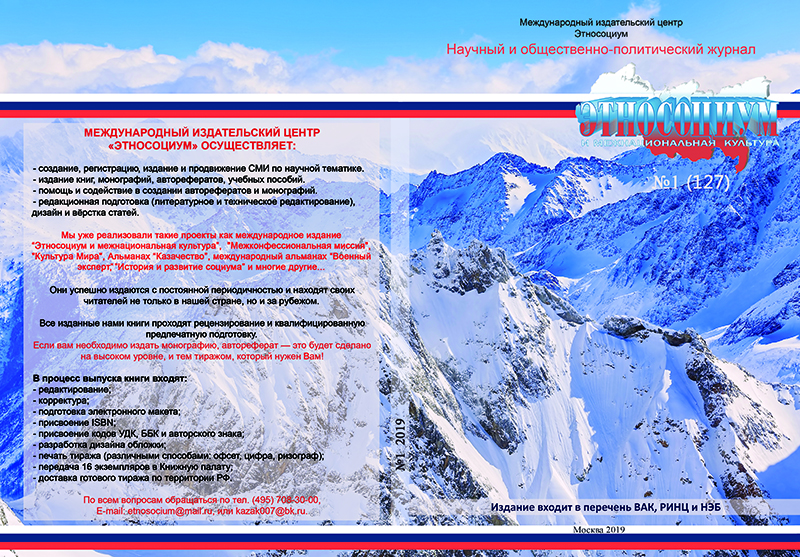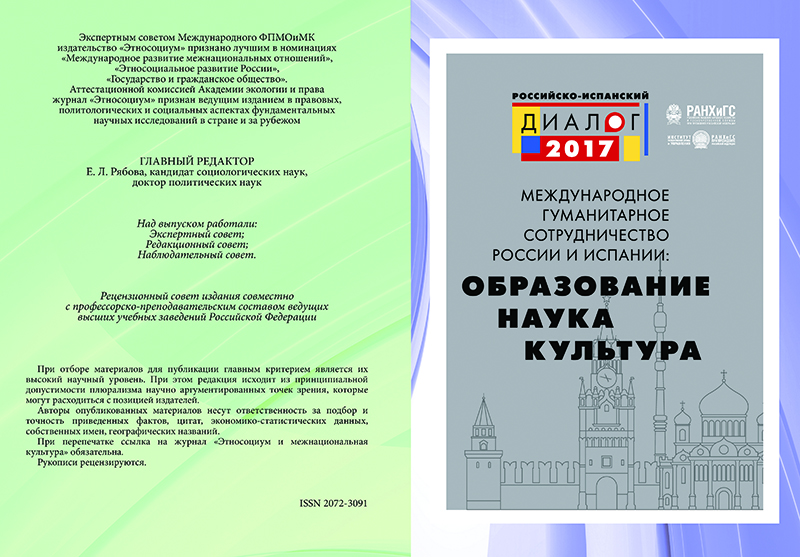

Content
|
COUNCIL OF INTERNATIONAL RELATIONSHIP
|
|
|
Zimin V.A. About improvement of political system of the country
|
9
|
|
Kovrigina G.D. Socio-philosophical foundations of patriotism
|
16
|
|
Lukyancev A.S., Ryabova E.L. The National Library of Belarus - national, scientific electronic library system as a project in national priority and “import substitution”
|
22
|
|
ACTUAL PROBLEMS OF MODERN SOCIETY:
POLITICS, ECONOMICS, LAW
|
|
|
Artamonova Y.S., Lihanova I.V. Civil society institutions as a resource of information security of a democratic state
|
31
|
|
Tkachenko E.N. Some aspects of development of system of continuous education
|
38
|
|
Murashko S.F., Kosireva M.S., Bogoslovskaya V.R. The functioning of globalism in the MODERN Russian language
|
46
|
|
Voronina A.V. Modeling of the formation mechanism of public opinion in the field of social space - first step to digitalization
|
54
|
|
REGIONAL STUDY:
POLITICS, ECONOMICS, LAW
|
|
|
Danakin N.S., Pitka S.N. Terms of foreign students adaptation in Russian universities
|
62
|
|
Biryukov S.V. Some problems of improving the efficiency of positioning of Volga federal district (including investment prospects)
|
72
|
|
INTERNATIONAL RELATIONSHIPS:
POLITICS, ECONOMICS, LAW
|
|
|
Nazarova A.K. The fundamentals of geopolitical strategies of Russia and China
|
82
|
|
Zhernovaya O.R., Petrukovich L.A. English as the tool of implementing migration policy
|
100
|
|
Lee Myoungson The role of public diplomacy in the development of government relations between Russia and the Republic of Korea
|
107
|
|
Hartmut Elsenhans Market or Labour Power: How to Overcome Rent
|
114
|
|
PRESS RELEASE
|
|
|
Ethno-economy and ethno entrepreneurship - the unique drivers of the development of Russia
|
144
|
|
International round table on the topic “Foreign Policy Activities in the Conditions of the Formation of a New World Order”
|
148
|
|
NEWS
|
|
|
Zorin V.U. Ethnocultural communications: power and civil society in the multinational metropolitan metropolis
|
150
|
|
Abstracts
|
153
|
|
Authors
|
163
|
|
Requirements to materials submitted to the international publishing house "Etnosocium"
|
167
|
In article it is shown that the political system of the Russian Federation in all variety of its communications and dependences is in a development stage today. The author considered a number of the directions of improvement of the Russian political system.
Keywords: Russian Federation, political system of the country, improvement, modernization, state.
The article discusses the socio-philosophical foundations of the development of patriotism. Both the ideological prerequisites for the formation of patriotism and the practical features of its introduction and development in the public masses are analyzed. It also presents the results of a study conducted in the Siberian Federal District, which illustrate the features of the formation of the socio-philosophical interpretation of modern patriotism.
Keywords: patriotism, philosophy, love for fatherland, Motherland, social representations, social attitudes.
The development of modern science involves the use of the maximum number of approaches and institutional structures to solve the problem of low demand for the results of scientific research of researchers, as well as the monetization of their intellectual work. Accordingly, for the qualitative and fast transition to the information society and the economy, the Russian state must effectively respond to the current challenges of our time. These include the development of a system of scientometric indicators, at least digitalization of science.
In this article, the authors refer to the Russian practice of forming a single digital electronic space of the library system, highlight features of the implementation of the National Electronic Library project, identify problematic issues and emphasize the benefits of the widespread implementation of programs and projects related to providing a large-scale and unhindered access of ordinary citizens and associations. students, scientists, regardless of their social status, place of residence, occupation, income and other social activities divisions to full-text sources.
Keywords: library, scientometric databases, science, education, culture, modernization, scientific electronic library, citation.
This paper presents the authors’ views on civil society institutions as active subjects of information security. Today this is manifested through an effective civilian control, functioning of every possible consultative body and in the formulation of political and other solutions. Despite the fact that the civil society, in contrast to the state, is not directly connected with the tasks of information security, it will act as a regulator of democratic processes in this field and will engage with government structures both directly and indirectly.
Keywords: institutionalization, civil society institutions, democracy, state, information security.
Dynamics of every day life and global social-economic trends, including in field of technologization and robotization of production processes require the one to review his/her attitude to own education and its renewal. Since practical implementation and search for more efficient forms, techniques, methods ad approaches to training adults represent actual research & development and applied problem the purpose of this article is to analyze modern tendencies in development of continuous education.
Article covers theoretical aspects of continuous education as socially-significant process and phenomenon, its difference from the traditional one, national comparison in part of coverage by programs of continuous education, and etc.
Keywords: education, continuous education, tendencies, prospects.
The article is devoted to the analysis of the specificity of functioning of a new class of words in the international vocabulary — globalisms in the modern Russian language. Special attention is paid to the specific features of globalisms as terminological vocabulary. The degree of internationality and potential globality of the meanings of the terms is associated by the authors with belonging to the history and state of terminology in each individual field of human activity, which has a pronounced international character. On representative examples the authors demonstrate two main vectors of functional adaptation of the global terminology in the Russian language the beginning of the XXI century: transterminologisation and determinologisation. National and international non-identity and disordered concepts, a lack of coordination in the construction of terms can lead to incomplete correlation and closure of globalisms within a specific industry terminology and, much more often, within the sublanguage of certain professional and social groups at the level of jargon. Each newly appearing slang unit not only provides informal communication of speakers of this slang, but also serves their professional (social) needs, and in the process of usage it claims to become an element of the lexical system of the General literary language. Globalism represents a stratum of the vocabulary, which is actively functioning in the speech of native speakers of Russian regardless of the lexicographic codification.
Keywords: dialogue of cultures, language globalization, vocabulary of modern Russian language, international vocabulary, functioning of borrowed vocabulary, terminology, professionally and socially marked vocabulary, jargon and common vocabulary.
The implementation of the strategy of building an information society with a digital economy, adopted in our country, can be effective and successful with reliance on positive public opinion. To study public opinion and control, they need to digitize this social process. Applied to public opinion, digitalization technologies are based on an understanding of the mechanisms for forming individual and general opinions. The article proposes two conceptual models of the mechanism of formation of individual opinion in the field of social space. The first, the system-synergetic model, describes the entire process as a whole. The second one, developed on the basis of information matrix surfaces, details the initial stage of the process.
Keywords: Public opinion, individual opinion, digitalization, system approach, simulation, system-synergetic model, matrix surfaces, matrix model, neural networks.
The article presents the results of a sociological study in terms of foreign students adaptation in Russian universities. There are six groups of conditions: natural-climatic, housing, gastronomic, valeological, material, social. Compara-tively more problems and difficulties arise with adaptation to natural and climatic conditions and living conditions in the dormitory. Most foreign students have financial difficulties, every fourth or fifth - problems with poor health. Many of them are exposed to racial discrimination, their rights are violated in the service sector.
Keywords: foreign students, Russian university, adaptation, natural and climatic conditions, housing conditions, health, racial discrimination.
The article is devoted to the possibilities of improving the positioning of the regions of the Volga Federal district in order to increase their attractiveness for foreign investors. The author considers this problem in the context of existing advantages and disadvantages of the regions included in the Volga Federal district. The author analyzes this project from the point of view of its ability to ensure the progressive development of the Volga region by means of a flexible coordination of Federal and regional interests.
Keywords: Volga region, Volga Federal district, regionalism, regional image, regional strategy, regional development, regional policy, attracting investors.
Theoretical, historical, natural-geographical, conceptual and ideological bases of geopolitical strategies of Russia and China are considered in the article.
Keywords: Russia, China, geopolitical strategy, theory, concept, ideology.
The article is devoted to the role of English in monitoring migration flows and movement of temporary mobile groups of people. The authors analyse various reasons of the influence of the English language from the point of view of creation of common economic, social andpolitical, educational and media environment, where English plays the role of a connector.
Keywords: global world, migration flows, universal means of communication, prolofiration of English, language policy.
The article examines the content of the role of public diplomacy of the key and most effective tool in Russian and South Korean in interstate relations. The author relates the concept of “public diplomacy” with the concepts of soft power, which allows for a more accurate understanding of its potential in the modern system of international relations. Particular attention is paid to the article "soft power", which becomes the most important channel of public diplomacy. The author examines in detail such aspects of the topic as the value of public diplomacy in international relations, various methods and forms of public diplomacy. The methodological basis of the research is formed by general scientific and private scientific methods of cognition: a systemic, institutional method, a comparative historical approach, case study methods, a structural-functional analysis, etc.
The author comes to the conclusion that it will provide an opportunity to clarify the concepts of public diplomacy, to determine its role in the development of interstate relations, and also to identify the factors that have a direct impact on the change of the Russian and Korean foreign policy strategies. In order to improve the national reputation of the two countries in terms of public diplomacy, find out what strategies are needed.
Keywords: public diplomacy, soft power, intergovernment relations, interaction of government, foreign policy strategy, national reputation.
Globalization does not necessarily lead the to a world system of capitalist economies. Under the prevailing conditions of disempowerment of labor, capitalism is too weak to transform rent-based underdeveloped economies. Globalization is driven by currency devaluation which transforms new comparative advantage into cost competitiveness. The major check on devaluation, full employment does not work in most cases. In order to globalize capitalism, labor in the South would have to be empowered. At the theoretical level a neoliberal understanding of capitalism as against Keynesianism blocks an understanding of the importance of mass consumption for maintaining capitalism. At the political level, mass movements where they exist in the South are captured by secular nationalism or cultural nationalism. An increasingly fragmented multipolar system emerges where rent seeking is promoted by governments.
Keywords: globalization, rent, Keynesian macroeconomics, international relations, class struggle, development.